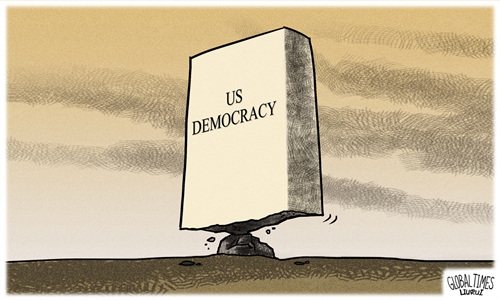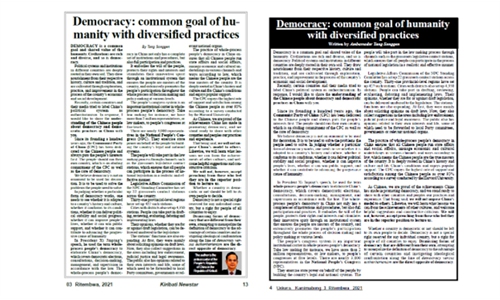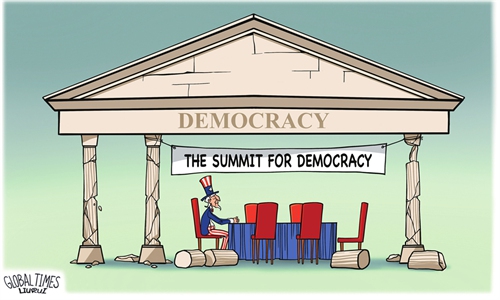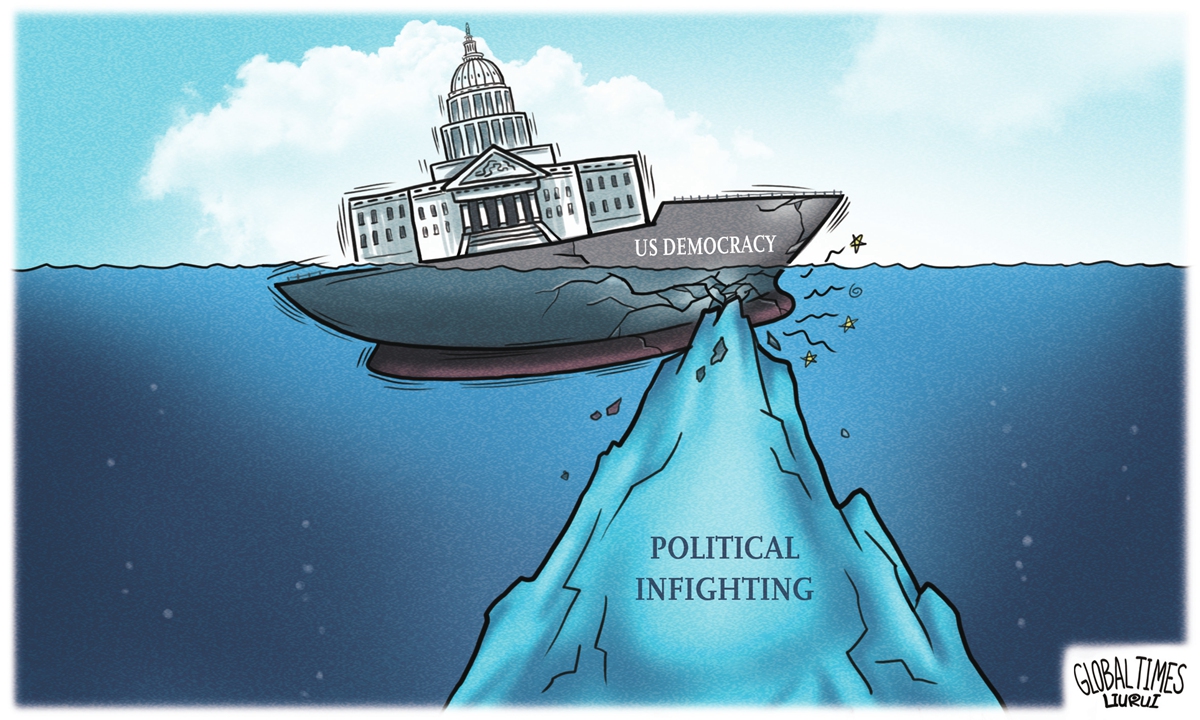
Weak democracy Illustration: Liu Rui/GT
Editor's Note:US President Joe Biden is about to fulfill a campaign promise by hosting a Summit for Democracy. Yet do the 110 leaders of states and regions represent democracy, which is supposed to be about people? "Democracy is about the climate of trust," said Peter Herrmann (Herrmann), professor at the Human Rights Centre at the Law School, Central South University, China, and member of the European Academy of Science and Arts. Unfortunately, there is no such trust in the society of the US and other Western countries today. In an exclusive interview with Global Times (GT), Herrmann shared his views on democracy and the differences of democracy between China and the West.
GT: The Summit for Democracy is generating another round of debate over the meaning of democracy. How would you define democracy? Does the US have the dominant power to define it?
Herrmann: I think we have problem with the term "democracy" - taking this one term to cover very different conditions and ambitions. Today, one can question if there is democracy (in the US), although the US uses this term for the summit.
Democracy is always thought to be something from below - getting people involved and letting people speak. So why the summit is all about having the top level talk about democracy? Several NGOs are also invited and so on and so forth. But democracy should be more about listening to what comes from the people, instead of inviting the people for showcases.
In the US, you have some major players determining what democracy is and who goes to the elections and who has the power. This has been shown very clearly by former president Trump's presidency, when he invited Silicon Valley leaders as advisors.
We have to be at least aware that there is not just one democracy. And democracy is something at local, regional, and then at the national level, and increasingly global. Today, there is no one country which should have the power to determine what democracy is, or say this or that is the model of democracy, which is valid for the world and benefits all countries.
GT: Some Americans seem to believe less and less in their democracy. For instance, the result of a general election is not accepted by the losing side. A large number of voters are convinced fraud affected the elections. How would you comment on the democracy in the US?
Herrmann: It is exactly the problem - you ask powerless people to execute once in a while an act of power through the elections. This is systematically from the top. This is not only a problem in the US, but in Europe as well.
Voting and electing is one aspect, the provision of information and canvassing in preparation is another issue and a different story. It has to be highlighted that democracy is especially about building political orientation and consciousness and responsibility.
GT: Why are voters getting increasingly divided? Why are more and more populist politicians elected? What is your biggest concern regarding Western democracy?
Herrmann: If you look at Brexit, for instance, there have been huge debates beforehand. And the debates had been highly misleading. If people would have known the consequences, if there would have been proper information, they would have voted in a different way. But they had been deceived during the preparatory process.
If you look at populism in Germany, there had not been many members of the nationalist Alternative for Germany (AfD) (a right-wing populist political party) in the Parliament a couple years ago. Strong populist forces can also be found in Italy, France - and the main problem is that people feel cut off, focusing on one single item: surviving and making the best out of the situation they are in. Populists manage pretty well in taking up on such demands: answering not to what is strategically necessary but to what finds immediate popular applause.
Take environmental issues. If I say parking has to be affordable, everybody will agree. But you have to say: Actually, parking will be more expensive, but we will have a properly organized public transport system, in which you don't have to depend on your own car.
You can find there are many examples that the populists have managed to take some points out of context and convince people. What is needed is a broad concept of participation: How does this affect our daily life? It is not a one-off decision but a complex process.
Why do they take things out of the context? One problem is with representative democracy. Many of the politicians today are full-time politicians.
In the worst case, when they entered the political system, they were very young, and then sit in the Parliament for the rest of their life. They are completely disjointed from real life. They are not workers, or working officers, not doing anything real. They are, of course, interested in being re-elected. So they have this capacity to focus on the next four years in terms of how they could get back into Parliament. They are not looking at a longer and wider perspective. They are not looking for a strategic approach.
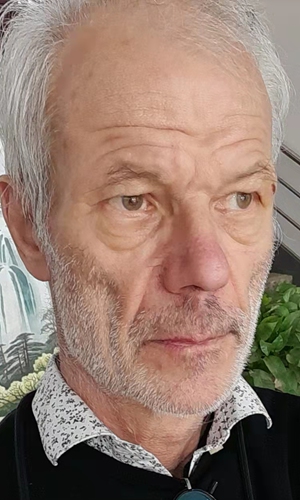
Peter Herrmann
GT: Do you think this democratic system in the West could bridge the gap in their societies?Herrmann: From what I see now, it is further widening the gap.
But I see more and more people are becoming aware of it. There are protest movements. There are claims that this cannot go on in this way and we have to find other ways. We have to make it working for and with and by the people. I think the general claim can be brought forward that we have to think about a different way of doing democracy, a different way of letting people having a say.
GT: How would you comment on democracy in China? What do you think is its biggest difference if compared with the democracy in the US or other Western countries?
Herrmann: I would say, democracy is about human rights. Democracy is about the climate of trust.
In the West, if there is something going wrong, when there are complaints in respect of the so-called liberal rights, political rights, there is a huge outcry, in particular when it happens in countries like China, Cuba or in Latin America. However, when the same happens to economic and social rights, no voice is being heard. In many European countries, hospitals do not have sufficient capacity, important surgeries are delayed because of the new waves of the pandemic. This is important for democracy: First and foremost, I have to survive, and then I can think about how I want to get involved.
The other thing is that of course it is not just about surviving. Human rights are about having rights to determine the own life, the way I want to live. This is about a way of living together with others.
What strikes me here in China is "trust." When I arrived here, I didn't have my own telephone number, I could not surf the internet. People gave me the internet connection. All I did on the internet had been on their record. They trust me that I would not abuse it.
I see other small things like this. Food is ordered and left on the table, in a large room or on the fences (by delivery guys). You would not trust anybody in Europe doing this. But here, people trust that other won't take it.
Human rights are about trust and trust is about having conditions where I can trust. If I live under conditions where I have to look after myself competing with others, this is a completely different story.
GT: You remind me of recent gun violence in the US, where people may not trust to be safe when walking in the streets at night.
Herrmann: Not even during the daytime. I have to say there are shocking examples.
GT: What's your take on the forthcoming Democracy Summit, for which the US get to decide on its own who can participate and who cannot. What signals does the summit sent to the world?
Herrmann: When it comes to the summit, what makes me really angry is what the US states in the document linked to the summit: We are showing one of the greatest abilities that democracy has to offer, and that is admitting imperfection.
They say we are imperfect. But if they are able to learn from it, I wonder why they keep the Guantanamo Bay? It is a question for ages. They did not learn anything. How can they come up now and say "we are ready to learn"? It is about permanent involvement in wars. Why is the US not able to learn?
There are ongoing problems in the health system, social care system, such that people cannot develop any trust. People are dying on the streets.
And then the president said: But we are able to learn and to admit our shortcomings. This is something I don't understand. This is simply ignorant.
